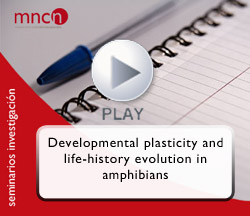Developmental plasticity and life-history evolution in amphibians. Iván Gómez Mestre Cientifico Titular Estación Biológica de Doñana CSIC Sevilla
Título: Developmental plasticity and life-history evolution in amphibians
Ponente: Iván Gómez Mestre, Cientifico Titular, Estación Biológica de Doñana, CSIC, Sevilla
Resumen:
Environmental factors affect gene expression during development in all living organisms, producing different phenotypes in different environments. Provided there are reliable environmental cues, selection in heterogeneous environments favours plasticity as it allows organisms to adapt to rapidly changing conditions. It is critical to account for developmental plasticity in models of adaptive evolution because plasticity contributes to the maintenance of genetic variation within populations, reduces bottlenecks when facing rapid environmental changes and confers an overall faster rate of adaptation. Conversely, if plasticity costs are high and the environment stabilises, selection results in genetic assimilation, which could result in trait divergence and species diversification. Current evolutionary theory contemplates that phenotypic divergence between species may initiate as environmentally-induced expression of alternative phenotypes. Descendant lineages of a plastic ancestor evolving in stable divergent environments may lose plasticity over time, their development becoming specialised to produce fixed phenotypes matching each environment. In that case, we would expect ancestral plasticity to mirror differences among taxa and that the same mechanism allowing ancestral plasticity was also the main mechanism explaining species divergences. In that light, we are studying mechanisms of plasticity behind the evolutionary divergence of spadefoot toads. Old World species (Pelobates) breed in long lasting ponds and have long but plastic larval periods, whereas New World species (Scaphiopus) have specialised in ephemeral ponds and have evolved very short larval periods. We hypothesise that Scaphiopus has undergone genetic accommodation of ancestral plasticity, which has resulted in canalized short larval periods. We are combining ecological, physiological, hormonal and genetic approaches to test this hypothesis.






